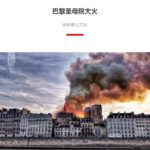How are the Chinese media and netizens responding to the riots in France? | Daxue Consulting
The “yellow vest” protests that have spread throughout France since November 17, turned violent in Paris over the weekend. Angry anti-government protesters in Paris wearing yellow safety vests smashed windows and set fire to vehicles and broke into a museum and several luxury stores. It is reported by the press that the unrest is the worst in the French capital since riots in 1968.
The difference of search volume between the time the French president Macron visiting China in January 2018 and the protest beginning from November 2018 to date
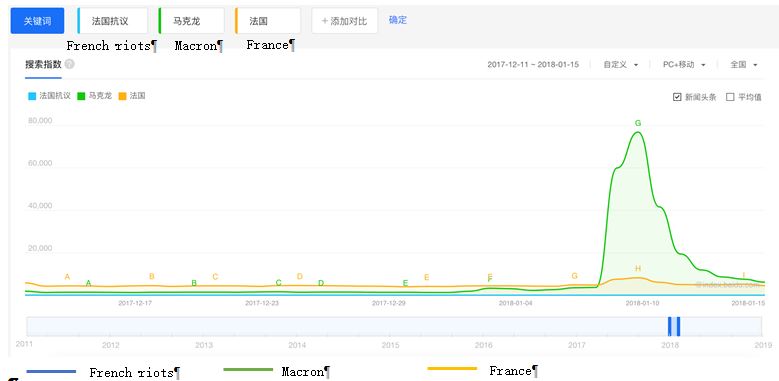
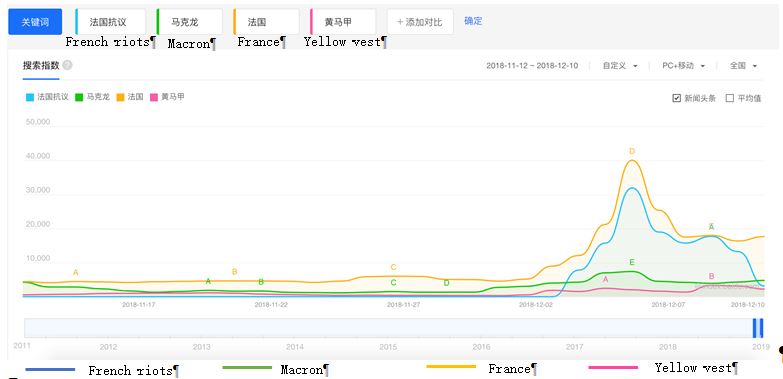
This Baidu Index (百度指数, an index that reflects the total number of searches on China’s leading search engine Baidu based on keywords) evolution graph shows the evolution of the search volume concerning the French riots from November 2018, illustrating the search for France, France’s riots and Macron reaching their individual peaks on Dec.5. Compared with Macron visiting China from January 8th to 10th, however, the search for Macron at that time has more than twice volume as it for the French riots. Still, it is worth noticing that for the unrest in the country, France as a keyword gains far more attention-beyond four times than Macron in terms of the search index. In this case, Baidu Index trend line reflects the downturn of the popularity of Macron for Chinese netizens even though the revolution happening in Paris closely related with the France president.
Search behaviors for France and Macron from 19th to 25th November 2018
Concerning the Baidu Index’s related keyword analysis, a large part of words associated with French riots is not closely correlated to this event itself.
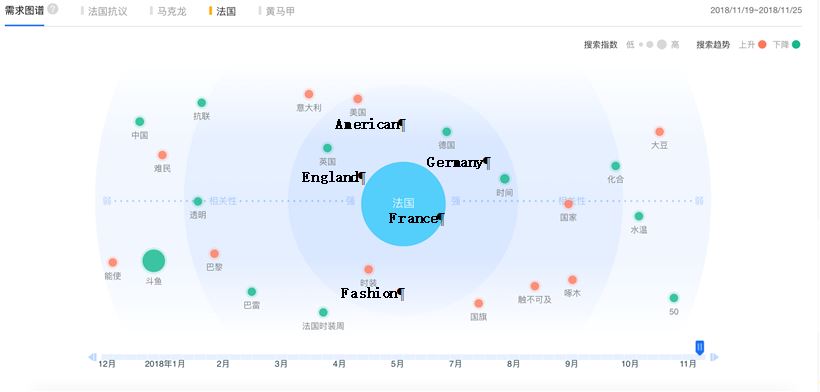
Graph of “France” and related keywords from 19 to 25 November 2018
In the first circle, strongly related words are “England”, “Germany”, “Fashion”, “American”. No associated words with France’s riots, yet it is important to notify that fashion is always the thing Chinese interested in France.Graph of “France” and related keywords from 19 to 25 November 2018.
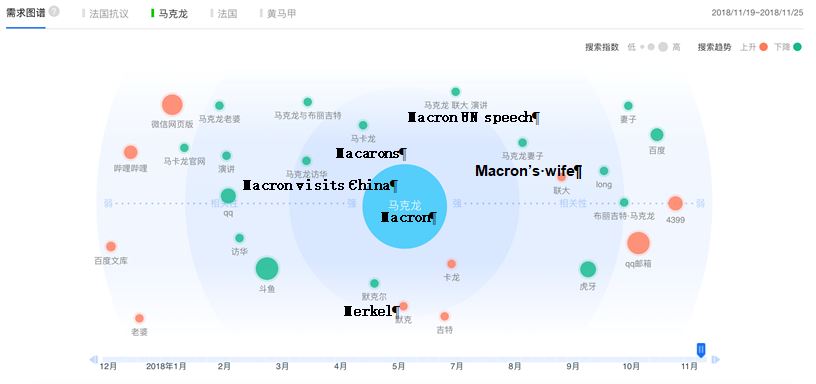
Graph of “Macron” and related keywords from 19 to 25 November 2018
The focus on Macron online is still surrounding his visit to China, his wife, his UN speech, his neighbor’s leader-Merkel. It seems that Chinese netizens did not relate the riots to Macron.
WeChat Index (微信指数)
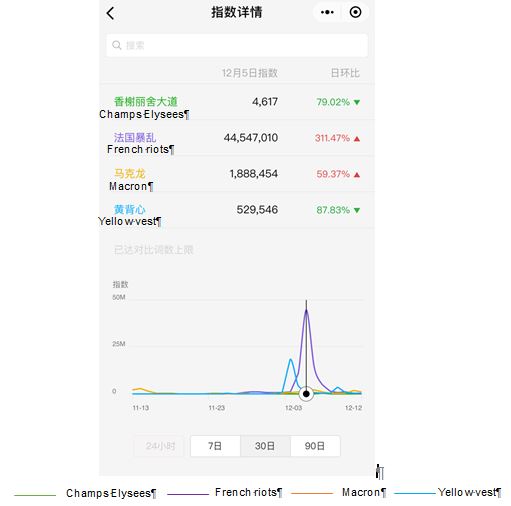
The WeChat Index reflects the search trend on WeChat-mostly used social media in China
Keywords “Yellow vest” and “French riots” reached peaks individually on December 3rd and December 5th respectively, which means “Yellow vest” firstly becoming a hottest topic to describe this event and then “French riots” coming next perhaps due to the conflict escalation more and more Chinese news media putting attention on it.
Weibo(微博)
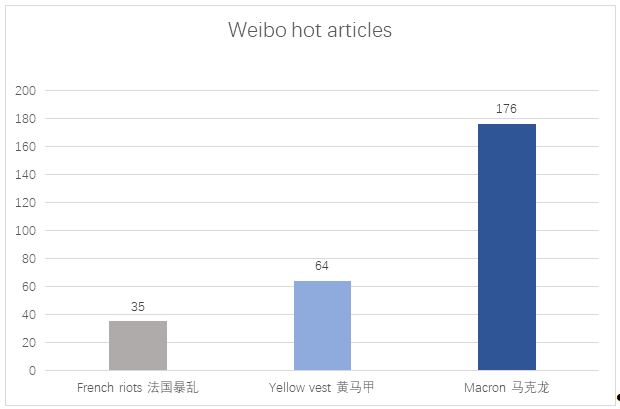
Numbers of articles concerning French riots in Weibo within a half month
As for discussion in the form of articles on Weibo from November 17th to December 11th, 2018, Macron got the most attention in terms of quantities. 176 articles include “Macron” in the titles of articles, compared with less than half of them regarding “yellow vest” and further less for “French riots”.
Based on the analysis, main search engines in China reflect relatively large amounts of search than ordinary times, but far below the period of time when Macron visited China in January 2018. Realistically, Chinese do not attach much importance to the events happening away from their home, moreover, the effects of such events are unclear to them.
Images are shown on the Baidu Image by searching the keyword “French riots”
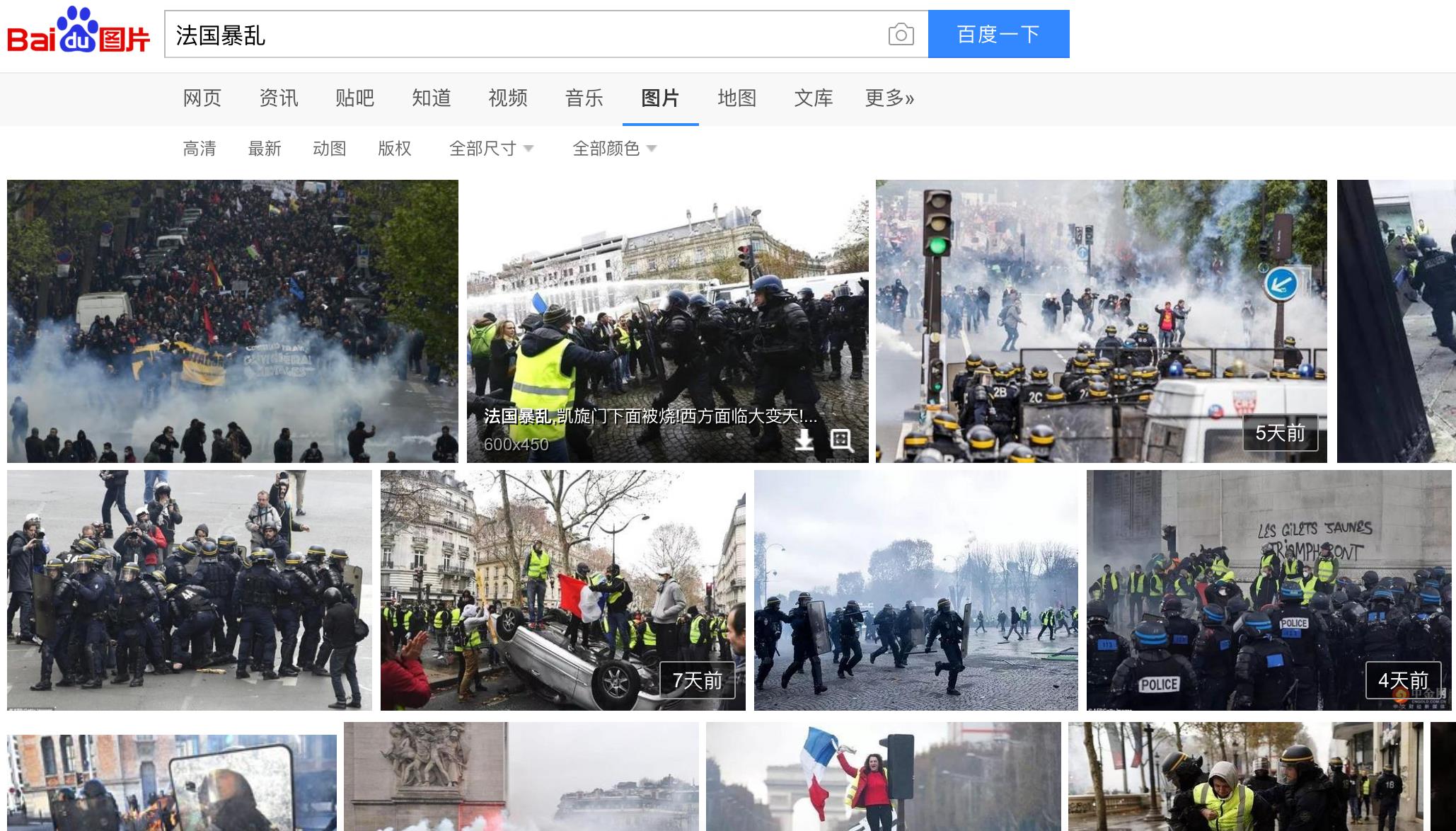
In the first page of search results, street pictures about riots in France show chaos and smog in this violent event, that is how Chinese internet presents such events.
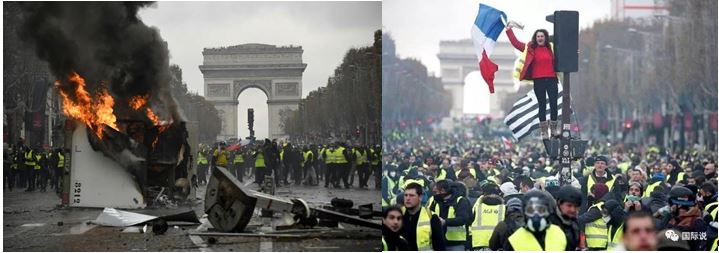
These two pictures can be seen in many China’s popular press releases, aiming to illustrate how violent and furious this time the French rebellion is.
How does the Chinese government respond to the riots in France?
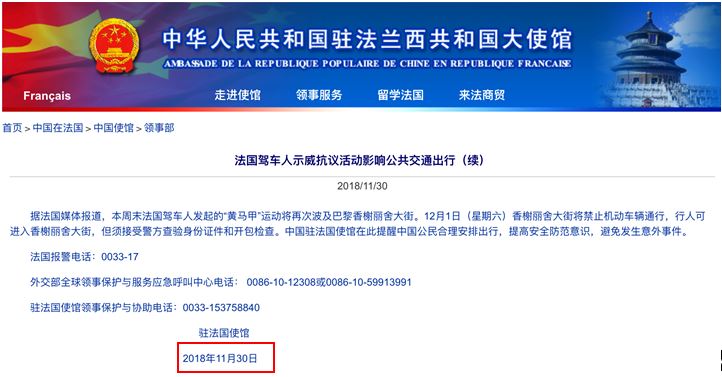
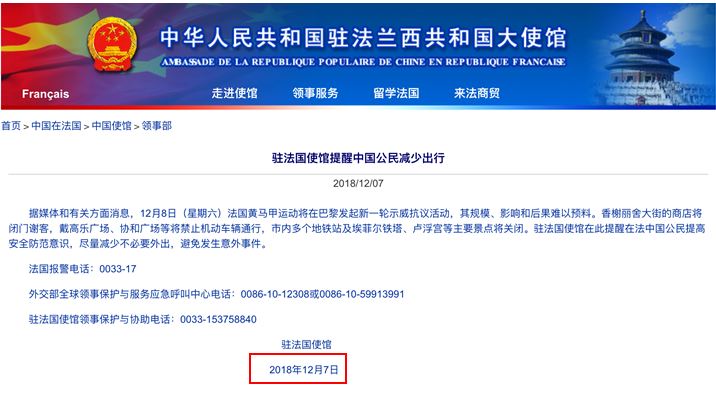
Two consecutive warnings published on the website of the Chinese embassy in France, November 30 and December 7 respectively; constantly focus on the situation going on in Paris. It gives the recommendation that people in Paris should be careful of any incidents around the violent area because of the “Yellow Vest” protest. The French police number and the embassy number are provided in case any help is needed.
Reports and comments from public accounts on WeChat

The article titled as “The most significant turmoil in the last 50 years: Musée du Louvre and Arc de Triomphe morphed into battleground full of smoke and blaze”. The reading volume of this article is over 50k. It analyzes the trigger and motivation of the demonstration, concluding that increase of the fuel price is only the cause, whereas the root cause is constant economic recession which leads to consumption capacity of French low-income group decreases along with life burden driving up.
One key opinion leader-Shuipi (水皮, a famous analyst in China, 6 million followers on Weibo) on WeChat also comments on the violent protests.

“Macron himself should be very clear that the reason for the violent protests is because the combined effect exerted by both global situation and domestic situation of France. The vanity of Macron’s government, due to Paris’s Agreement, forces the use of new energy as well as raises fuel taxes, and in the conditions of a sharp decrease of the gasoline price globally, the price in France increases rather than decreases as other countries. In addition to fuel taxes, the French government makes a deduction on taxes as Trump does in America, leading to pouring oil on the fire, further contradictions between upper and working class.”
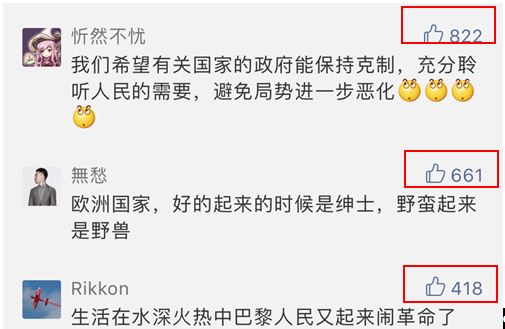 The hottest 3 comments on this article express different opinions, the first one of which says: “We hope related countries should protect people from hurt and in the meantime, listening to people’s voice, avoiding the situation getting worsened”. The second one says: “European countries sometimes are gentlemen but sometimes are beasts”. The third one is being sarcastic.
The hottest 3 comments on this article express different opinions, the first one of which says: “We hope related countries should protect people from hurt and in the meantime, listening to people’s voice, avoiding the situation getting worsened”. The second one says: “European countries sometimes are gentlemen but sometimes are beasts”. The third one is being sarcastic.
As for scanning through discussions on WeChat, the analysis of the riots in France is relative deep inside the event. Even though sarcastic comments exist which is common for people talking about politics, Chinese netizens on WeChat more ration-inclined.
What do Chinese say in special-topic pages on various news apps?
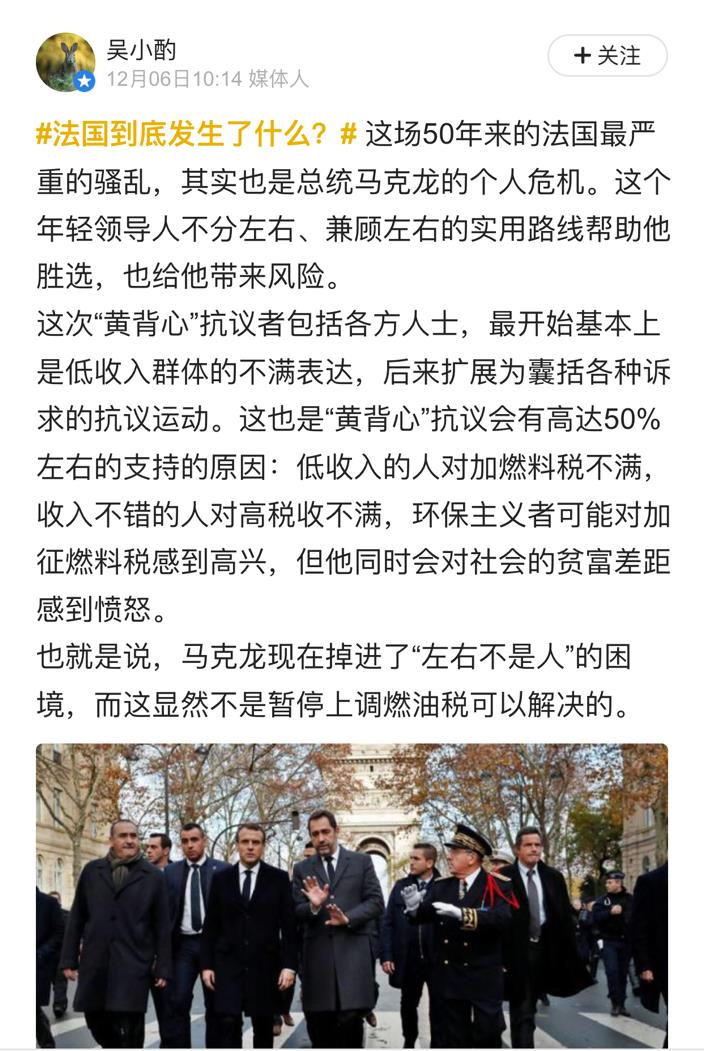 |
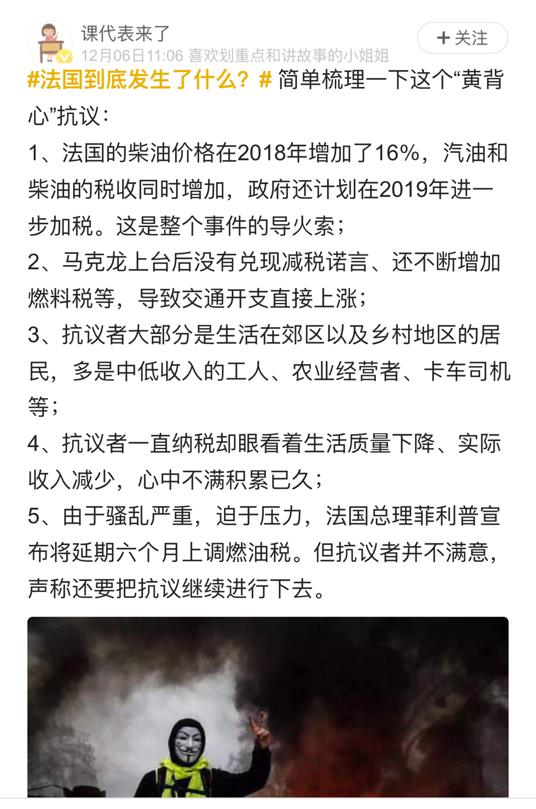 |
This comment argues that the price of diesel has increased by 16% in 2018 and raising taxes as the government planned in 2019 propels the strikes further to violent protests. Also, it emphasizes the analysis of the details of occupations and living conditions of most protestors.
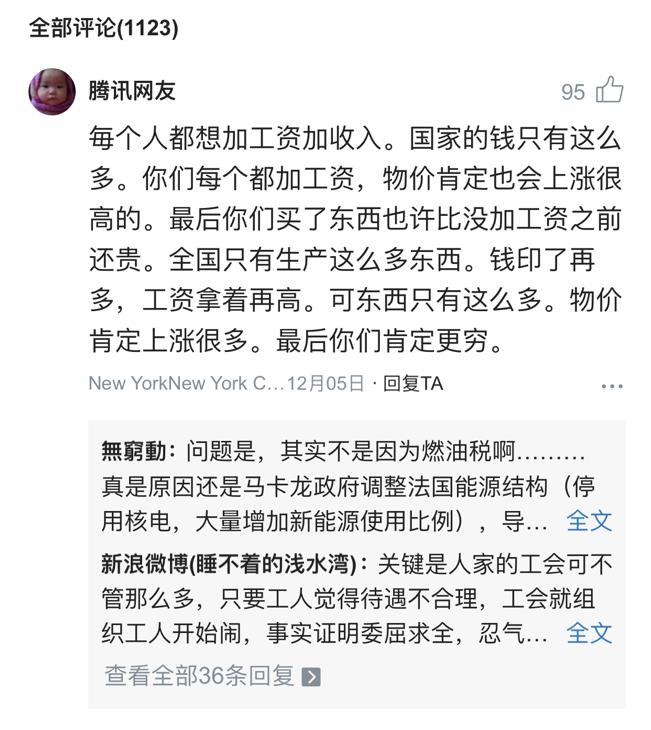
This account comments that this social turmoil is the critical moment for President Macron. Also, it argues that the pause of taxing is apparently not enough to tackle this situation.
This comment says: “Everyone wants to increase income, which is impossible since raising salary would cause inflation. It is a vicious circle leading to the protest as a result.
News apps are gaining much more attention in recent years in that people are more mobile-focused and get used to obtain information through them. Several news apps with significant traffic among others have “French riots”-special topic, a particular area for discussion since the beginning of the Yellow Vests movement. Some accounts focus on the facts of the protest, some criticize the western political system, some think for Macron to silence the protestors, some blame protestors for the violent actions, all of them from different perspectives, contributing to a comprehensive picture.
How do Chinese travel agencies react to the riots in France?
Mafengwo (马蜂窝)
Mafengwo 马蜂窝 – a Chinese travel platform providing various services for tourists – gave a warning on this event on December 8 when “Yellow vest” would hold another demonstration in Paris.
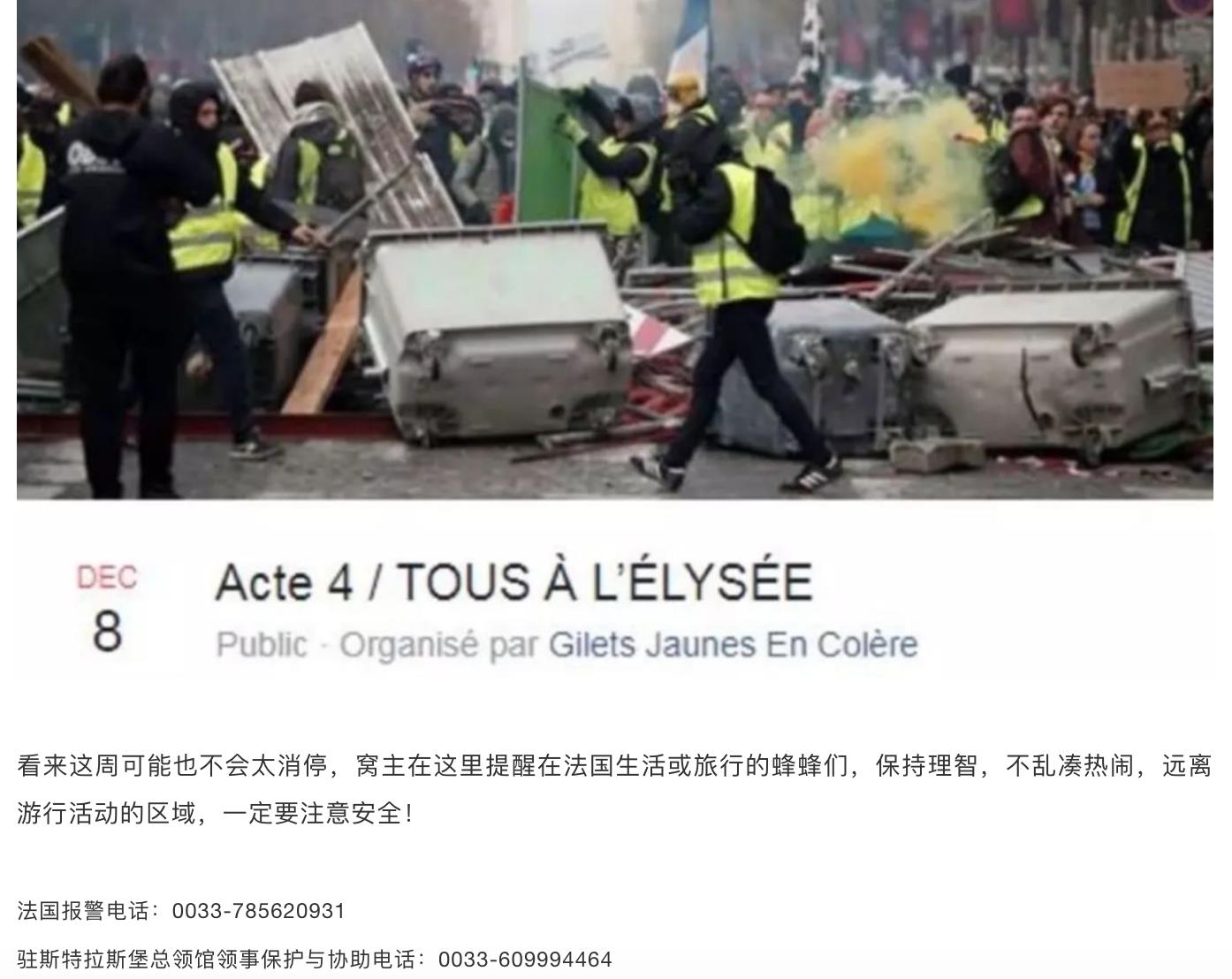
The warning says: “It seems like the unrest continuing to last for the following weekend. Mafengwo has the responsibility to warn people living or having a trip to France to be rational and not to hang out in the area of protests, to be careful as much as possible.”
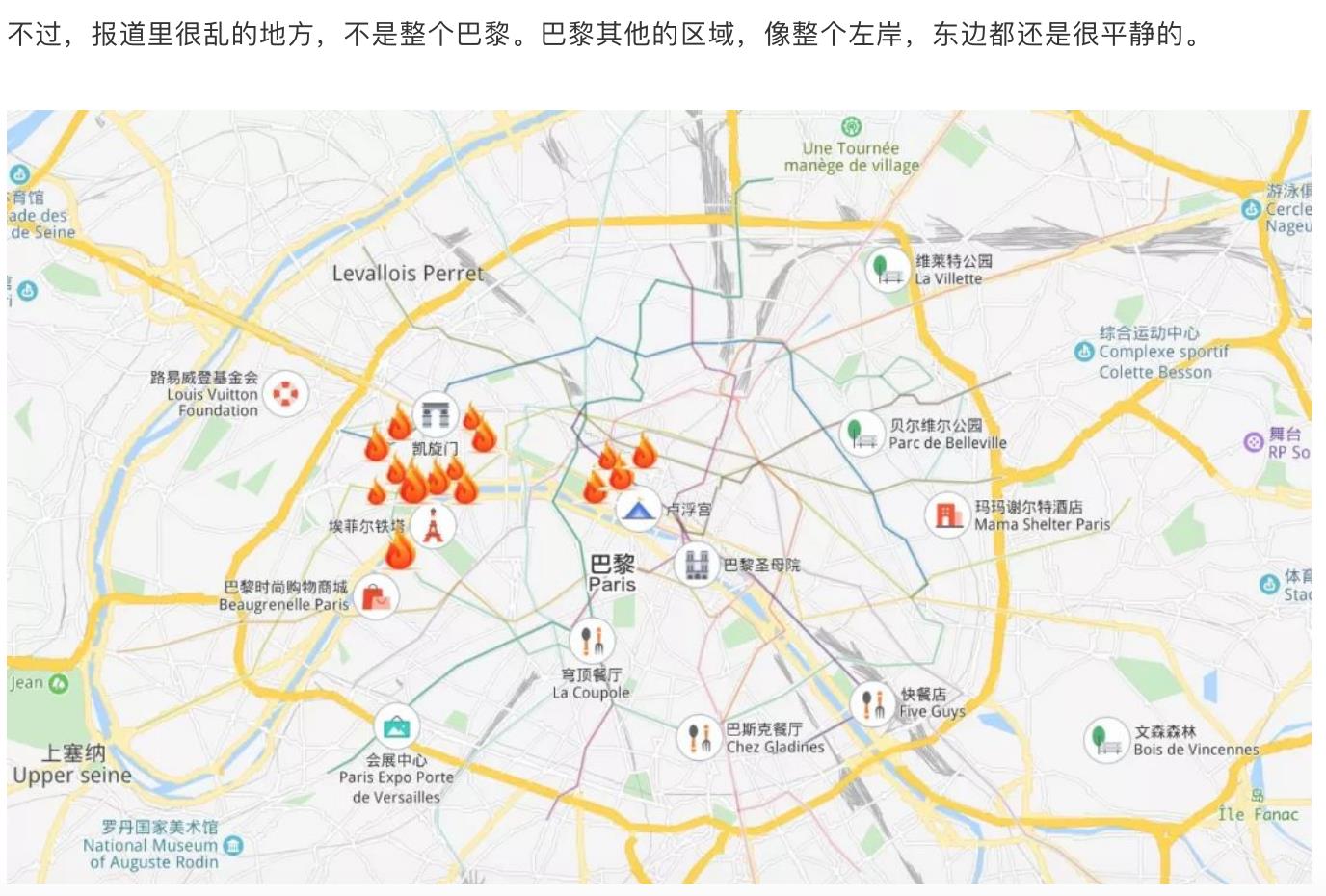
Also, it exhibits the intense area in Paris right now and adds the comment that the eastern side of Paris is quite peaceful.
Ctrip (携程)

Ctrip comments: “Guiders in Paris have been told to enforce safety during trips and to adjust schedules according to the situation and projected risks if it’s necessary.”
Chinese travel agencies seem don’t put much attention on this, perhaps because the strikes in France is common in their points of view, or according to their message from European branches, the violent extent is under their alert line.
People actually living in Paris see what is happening there
A freelance journalist living in Paris made an onsite interview directly with protesters on the street on December 8.
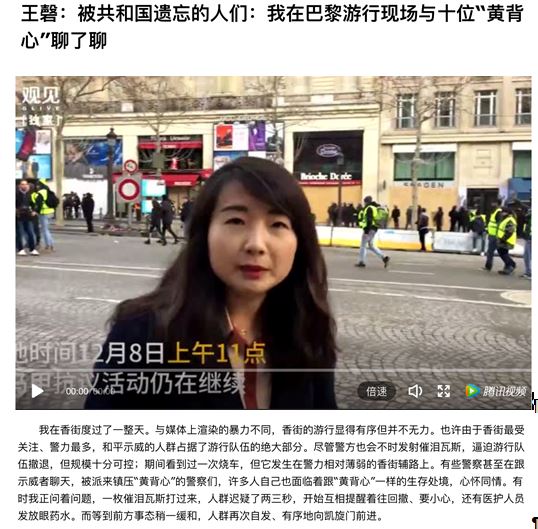
After spending a whole day on the Champs Elysees avenue, she argued that the protest was not as chaotic as most media reported, instead, the demonstration on that day is relatively ordered yet powerful one. The police did some necessary actions to keep protesters in Paris from intruding into deeper corners but not too much violence confrontation happened during the day. From her observation, both groups are relatively rational, and the situation is not beyond control.
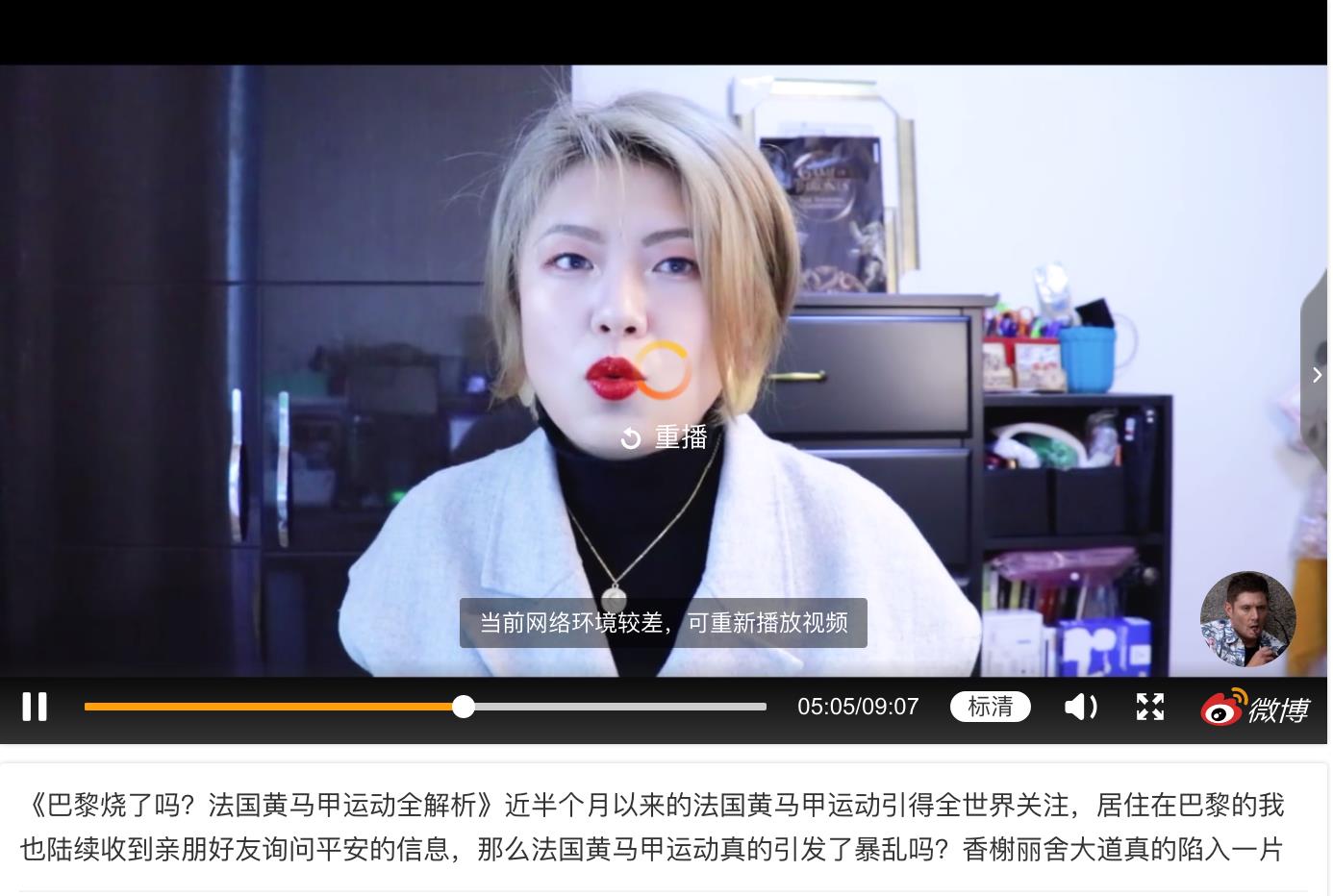
This video on Weibo made by a Chinese person on December 11
She says: “I have been living in Paris for many years since I was a student. The protest in Paris is legal and common, but the intense extend like this may be the most violent one since I came here.” Also, she gave her warning to students in Paris not to attend such rise ups.

Given Chinese students overseas likely watching videos on YouTube very often, there is actually an over 10k-watched video on this platform made by a Chinese girl and her French boyfriend (only 187 followers actually, but this video gains popularity).
In this video, the couple analyzes the event from their own experiences and compares it with previous ones. They even dug into the group psychological level and anticipated the situation would rage on in the following weeks.
A big picture of riots in France
France has gained the attention of Chinese media as well as Chinese netizens due to French riots, however, far less than the starting of the year when Macron’s official visit to China. From research on the reports and comments from Weibo, WeChat, news apps, online travel platforms and videos concerning this event, Chinese who live in China emphasize on a broader analysis rather than practical aspects, whereas Chinese who live in France pay much attention to the safety of daily life, travel, and the impacts of the riots. To be specific, people living in Paris don’t believe that the real situation of demonstration is as intense and violent as reported by Chinese online media.
Author: Will Qian
Daxue Consulting is able to run Omnibus survey all over China, in Shanghai, Beijing, Hong-Kong and many tiers 1 and 2 cities in China.
Omnibus surveys are a cost-effective way to get valuable, proprietary information about the citizens in China. If you are not sure between running an omnibus survey or a custom survey, Daxue Consulting team will be delighted to suggest a most suitable methodology with the given objectives, outlining the pros and cons of both methodologies, and the pricing options. For more information do not hesitate to contact us at dx@daxueconsulting.com.


